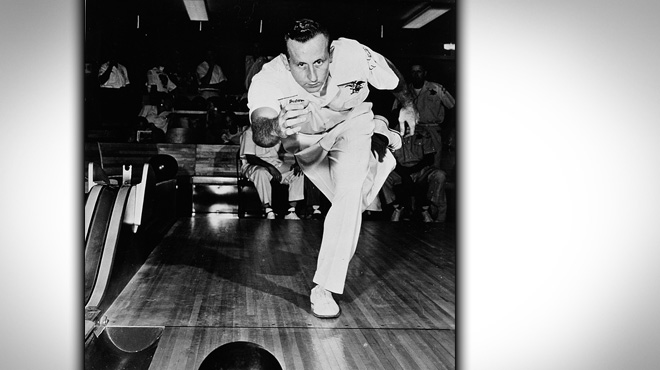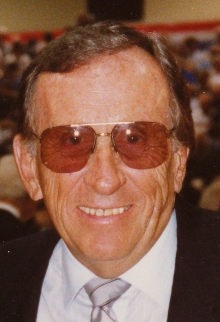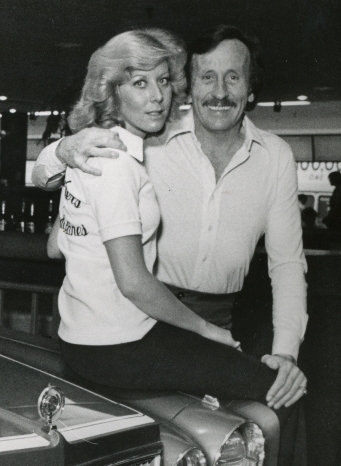Don Carter, USBC and PBA Hall of Famer, dies at age 85

Bowling community reflects on Don Carter
ARLINGTON, Texas - Don Carter, one of the most prominent and successful players in the sport of bowling, died at his home in Miami on Thursday night. Carter, who had recently been hospitalized with pneumonia complicated by emphysema, was 85.
A United States Bowling Congress and Professional Bowlers Association Hall of Fame member, Carter dominated major bowling tournaments during the 1950s and early 1960s. He won four Bowling Proprietors' Association of America All-Star (now U.S. Open) titles, five World Invitational titles, the inaugural PBA National Championship and the USBC Masters to become the first bowler to complete the sport's Grand Slam.
"Don Carter was a tremendous competitor, a pioneer for professional bowling and one of the greatest ambassadors of our sport," USBC Executive Director Stu Upson said. "He was an amazing person and truly will be missed." Carter was selected as Bowler of the Year six times by the Bowling Writers Association of America, named to the Bowlers Journal All-American team 11 times and was voted Greatest Bowler of All Time by Bowling magazine's panel of experts in 1970, the same year he was inducted into the USBC Hall of Fame.
Carter was selected as Bowler of the Year six times by the Bowling Writers Association of America, named to the Bowlers Journal All-American team 11 times and was voted Greatest Bowler of All Time by Bowling magazine's panel of experts in 1970, the same year he was inducted into the USBC Hall of Fame.
"It's hard to explain what makes Don so great," Dick Weber said in a 1962 Bowlers Journal story. "All I know is that he's the greatest thing that ever happened to bowling. He's fabulous, above and beyond everybody in the game."
In addition to his success on the lanes, Carter was a popular spokesperson, appearing in television commercials for Viceroy cigarettes, J.C. Penney, Palmolive Rapid Shave and Wonder Bread, among others. In the 1980s, he appeared as the "Famous Pro Bowler" in the Miller Lite beer commercial series featuring famous retired sports personalities.
Carter was the first athlete in any sport to sign a $1 million endorsement deal, agreeing to a 10-year agreement with Ebonite in 1964. Carter already had been grossing more than $100,000 per year through endorsements, tournaments, exhibitions and investments.
With an unorthodox style - crouched, with his arm bent as he delivered the ball - Carter jumped into the spotlight when he captured the 1952 BPAA All-Star title at Chicago's Coliseum. He would defend that title the next year, and would win the event again in 1957 and 1958.
He joined the Pfeiffer team of Detroit and helped them to the 1953 USBC Open Championships team title but would return to St. Louis to become part of the Budweiser team, one of the most well-known bowling teams in the sport's history.
The Budweiser team would capture the National Team Match Games title four consecutive years starting in 1956. The team of Carter, Dick Weber, Ray Bluth, Tom Hennessey and Pat Patterson set the American Bowling Congress' all-time team high series record on March 12, 1958, combining for a 3,858 series. The record would stand for more than 35 years.
In the meantime, Carter was winning the biggest individual titles. In his nine BPAA All-Star tournament appearances between 1952 and 1960, Carter won four times and never finished lower than fourth (he withdrew one year because of an injury). He was equally, if not more, dominant at the World Invitational, winning five titles and finishing second during a six-year span (1957-1962).
He would win the PBA National Championship in 1960 and capture the 1961 USBC Masters title to become the first bowler to complete the so-called Grand Slam of his era - the BPAA All-Star, World Invitational, PBA National and USBC Masters.
Carter also was a founding member of the Professional Bowlers Association Tour. With Carter's support and encouragement, Eddie Elias, a lawyer and sports promoter who eventually would became Carter's business manager, proposed a pro tour to players at the 1958 Masters in Syracuse, N.Y. Carter served as the PBA Tour's first president in 1958-59 and would take a second term in 1961-62.
He would win just seven PBA titles (not including his four All-Star titles) but would set a tour record with 18 top-five finishes, including four titles, during the 1962 season. He was inducted into the PBA Hall of Fame in 1975, and during the PBA Tour's 50th anniversary celebration, was selected No. 11 on list of the 50 Greatest Players in PBA History.
 In 1973 he married Paula Sperber, also an accomplished bowler who was inducted into the USBC Hall of Fame in 1994. Carter's first wife, Laverne, also is a member of the USBC Hall of Fame. The first PBA tournament named in honor of a player was named for Carter and, more recently, the PBA twice conducted the Don and Paula Carter Mixed Doubles Championship events.
In 1973 he married Paula Sperber, also an accomplished bowler who was inducted into the USBC Hall of Fame in 1994. Carter's first wife, Laverne, also is a member of the USBC Hall of Fame. The first PBA tournament named in honor of a player was named for Carter and, more recently, the PBA twice conducted the Don and Paula Carter Mixed Doubles Championship events.
Knee problems eventually would force Carter from the sport. He retired following the 1972 PBA Ebonite Classic but remained actively involved in the sport as an owner of a series of Don Carter All-Star bowling centers. As a proprietor, he hosted a number of professional tournaments.
"I didn't just want to go out there and show up," Carter said in a 1994 interview with Bowling magazine. "I wanted to win. If I couldn't win, I didn't want to compete. And my knees made it so I couldn't practice and hardly could complete a tournament."
Born in St. Louis, Mo., on July 29, 1926, Carter was more interested in baseball and football while in high school. After graduation, he served two years in the Navy before signing a baseball contract with the Philadelphia Athletics. He was sent to the minor league team in North Carolina.
In a Bowlers Journal interview in 1970, Carter said he hit .304 and did pitch some games, but the team played 128 games in 112 days and he lost 30 pounds from his 180-pound frame.
"I got $150 a month plus room and board," Carter recalled. "Riding that bus all over the countryside to games was too much. I quit after a season."
That would lead Carter back home to St. Louis and the start of his career in bowling.
Details regarding memorial services for Carter are pending.
AWARDS AND HONORS
- Voted Greatest Bowler of All Time in 1970 poll by Bowling magazine
- Voted Bowler of the Century by Bowlers Journal in 2000
- Six-time Bowling Writers Association of America Bowler of the Year (1953-54, 1957-58, 1960, 1962)
- 11-time Bowlers Journal All-American (1951-54, 1957-63)
- Ranked No. 11 on Professional Bowlers Association's 2009 list of 50 Greatest Players in PBA History
PROFESSIONAL BOWLERS ASSOCIATION (PBA)
- Won PBA National Championship in 1960 and seven PBA titles (not including his four All-Star titles)
- Founding member of the PBA and the organization's first president (1958-59)
- Set single-season PBA record in 1962 with 18 top-five finishes; tied with Dick Weber with seven consecutive top-five finishes
- Inducted into PBA Hall of Fame in 1975
UNITED STATES BOWLING CONGRESS (USBC)
- Won the USBC Masters in 1961
- Won four USBC Classic Division titles and was the first to record three All-Events totals of 1,900 or greater (1951-53)
- Inducted into USBC Hall of Fame in 1970
OTHER HONORS AND ACHIEVEMENTS
- Won the Bowling Proprietors' Association of America All-Star, now known as the U.S. Open, four times (1953, 1954, 1957, 1958)
- Won the World Invitational five times (1957, 1959-1962)
- Member of legendary Budweiser bowling team with Ray Bluth, Dick Weber, Tom Hennessey and Pat Patterson that set the record for five-man team score of 3,858 on March 12, 1958. Carter contributed a 754 series with scores of 266, 253 and 235 to the record that stood until 1994
- Inducted into Missouri Hall of Fame in 1962
- In 1964, became the first pro athlete to sign a $1 million endorsement deal, a 10-year agreement with Ebonite
- Varsity baseball and football player in high school, later signed to a contract with the Philadelphia Athletics as an infielder/pitcher in 1946
- Enlisted in the Navy in 1944 where he spent two years as a radar man in the South Pacific
DON CARTER FIRSTS
- First bowler to win every major tournament
- First athlete in any sport to sign a $1 million endorsement contract
- First bowler to have a PBA tournament named for him
- First bowler selected for the Madison Square Garden Hall of Fame
- First active bowler to be named to the Billiard and Bowling Institute of America's Hall of Fame
- First 800 series on TV, an 809 on National Bowling Champions
- First to "Make That Spare" on network television (he did it twice)





